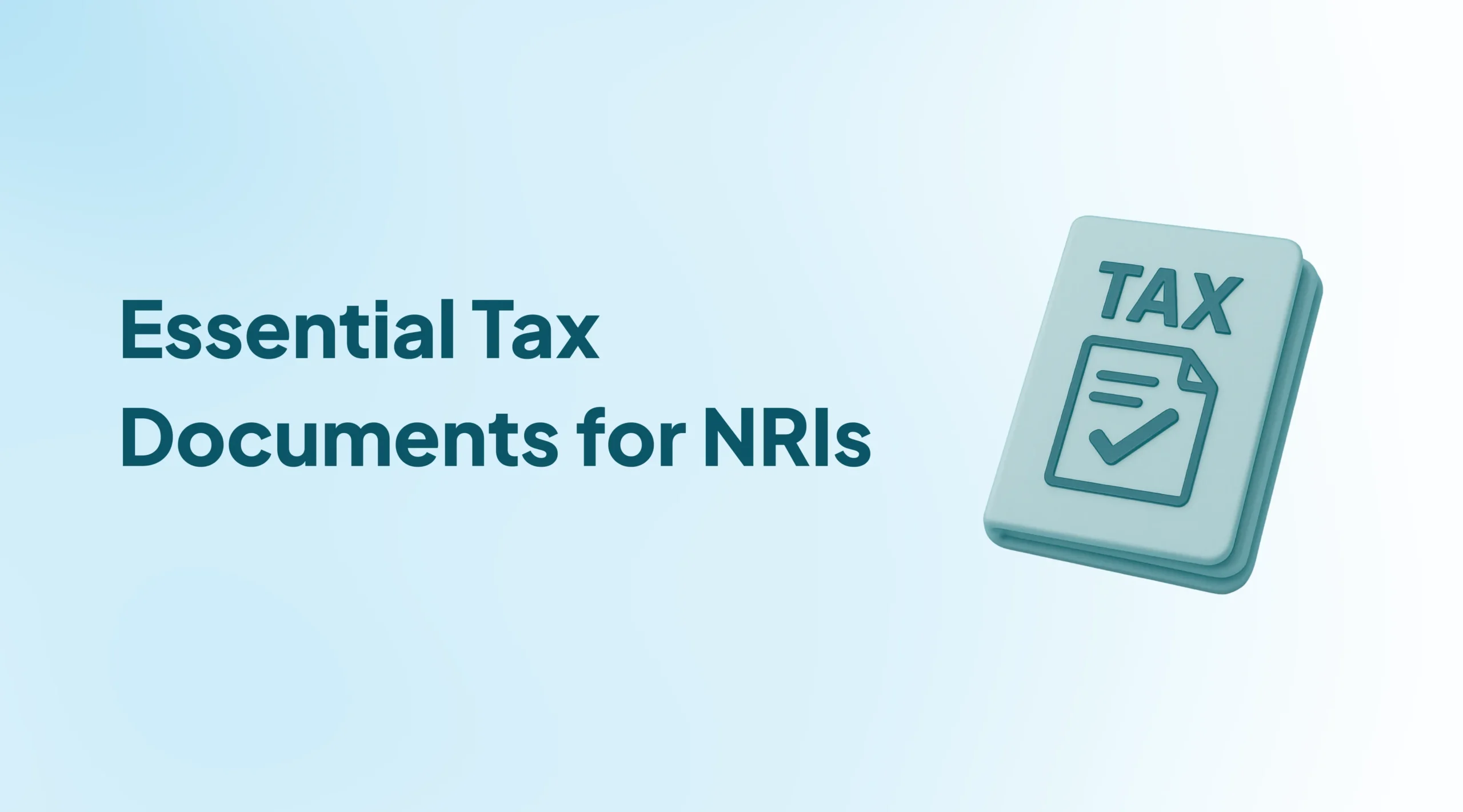Every Non-Resident Indian (NRI) knows tax filing isn’t just about numbers. It’s also about paperwork. Tons of it.
One missing form. One old passport. And suddenly, you’re either staring at a tax notice or, worse, missing out on a major refund.
This guide walks you through 10 must-have tax documents that every NRI should organize before they file taxes in India and, in some cases, abroad (like in the US, UK, or Canada). Whether you’re claiming DTAA, filing an Indian ITR, or preparing your FBAR, these documents will keep you sane.
Let’s make tax season simpler, one document at a time.
Why Document Preparation Matters for NRIs
As an NRI, you’re caught between two worlds. You might be earning in the US, investing in India, and paying taxes in both.
That’s a lot to track.
Being organized with your tax documents means:
- No missed deadlines
- Fewer notices or penalties
- Accurate tax returns in multiple countries
- Smooth DTAA claims (Double Taxation Avoidance Agreement)
- Peace of mind during assessments or audits
Think of these documents like your seatbelt. You hope you never need it. But when the ride gets bumpy, it could save you a lot of trouble.
How We Chose These 10 Documents
These aren’t just random picks. We chose each document based on real scenarios that NRIs face during tax season.
Tax Filing in India vs the US/Abroad
- India wants to know your global income.
- The US (and a few other countries) wants to know about your Indian assets.
- That means you need a bridge of paperwork that satisfies both systems.
DTAA & Foreign Tax Credit
- To avoid paying tax twice on the same income, you need to prove:
- You already paid tax elsewhere
- You’re eligible for DTAA relief
- The proof? You guessed it: documents.
Avoiding Notices & Penalties
Many NRIs get tax notices not because they did something illegal, but because they didn’t provide enough information. Missing documents = red flags = extra scrutiny.
NRI Tax Documents Checklist
Here’s what every NRI needs to gather. We’ve listed each document with examples, where to get them, and why they matter.
1. PAN Card
Why it’s important: Your Permanent Account Number (PAN) is your identity in India’s tax system. You cannot file an ITR without it.
Tip: Make sure your PAN is linked to Aadhaar, even if you’re an NRI. It’s mandatory for most resident taxpayers and often requested during assessments.
2. Passport & Visa Copies (Entry/Exit Stamps)
Why it’s important: Tax residency in India is determined based on the number of days you spent in India during a financial year.
What to keep:
- Copy of all passport pages with immigration stamps
- Visa documents (especially if you hold multiple visas or residencies)
Real example: Say you lived in India for 182 days in a financial year. That can change your residential status to Resident but Not Ordinarily Resident (RNOR) or even Resident, changing your tax obligations.
3. Form 16/Form 16A & Salary Slips
Why it’s important: This shows your income from employment and any TDS (Tax Deducted at Source). Explore our TDS Refund Calculator.
- Form 16: If you had a job in India
- Form 16A: For income other than salary (like freelance or consulting)
- Salary Slips: Especially useful if you worked abroad but need to report a foreign salary
Tip: Keep your foreign pay slips handy too. Especially if your US income must be declared in India under global income rules.
4. Bank Statements (NRE/NRO/Savings FD Interest)
Why it’s important: Interest from NRE accounts is tax-free, but NRO account interest is taxable in India.
What to include:
- Annual bank statements from NRE, NRO, and FCNR accounts
- Fixed Deposit interest certificates
Tip: Mark entries that are income-generating like rent credit or dividend payments, to avoid confusion later.
5. Form 26AS & AIS/Tax Credit Statements
Why it’s important: These government-issued records reflect TDS, advance tax, and high-value transactions.
- Form 26AS: Tracks taxes paid or deducted in your name
- AIS (Annual Information Statement): Gives a detailed view of income and transactions
Example: If your tenant deducts TDS on rent paid to you, that will reflect in your Form 26AS. It ensures you don’t miss reporting taxable income.
6. Investment & Capital Gains Statements
Why it’s important: Capital gains from stocks, mutual funds, or real estate must be reported even if you’re an NRI.
What to collect:
- Demat account statements
- Mutual fund capital gain reports (usually from CAMS/KFinTech)
- Equity or debt investment reports
- Stockbroker gain/loss summaries
Tip: Make sure to separate short-term and long-term gains. Tax rates differ.
7. Property/House Rent Income Receipts
Why it’s important: If you rent out property in India, the income is taxable even if you’re abroad.
Keep copies of:
- Rental agreements
- Monthly receipts
- TDS certificates from the tenant (Form 16C)
Note: Even vacant properties might be subject to deemed rent taxation in some cases.
8. DTAA Relief Forms (Form 67, 10F, Tax Residency Certificate)
Why it’s important: To claim DTAA benefits, you need to prove tax residency in your home country.
Documents you’ll need:
- Form 67: To claim foreign tax credit in India
- Form 10F: Self-declaration of residency
- Tax Residency Certificate (TRC): Issued by your country’s tax authority
Example: If you pay tax on dividends in the US and want to claim a credit in India, Form 67 + TRC is essential.
9. US Tax Forms (W-2, 1099, FBAR, Form 8938)
Why it’s important: Many NRIs are US Persons for tax purposes. The IRS expects full foreign disclosure.
Documents to gather:
- W-2 / 1099: For employment and other income
- FBAR: If you held over $10,000 in foreign accounts
- Form 8938: For foreign assets and investments
Tip: Indian accounts like NRE, mutual funds, or ULIPs can count as foreign financial assets.
10. Receipts for Deductions (80C, 80D, Insurance, Loan, Donations)
Why it’s important: To reduce your taxable income in India.
Eligible deductions include:
- Section 80C: Life insurance, PPF, school tuition, etc.
- Section 80D: Health insurance premiums
- Section 80G: Donations
- Home loan principal/interest
Tip: Don’t just save the receipts. Note the section it qualifies for. That’ll save time during e-filing.
Document-Specific Tips & Common Pitfalls
Mistake #1: Mixing up NRO vs NRE interest income
NRO is taxable. NRE is (usually) not.
Mistake #2: Not claiming foreign tax credit because Form 67 wasn’t submitted on time.
Mistake #3: Forgetting to download Form 26AS or AIS, leading to mismatches in declared income.
Mistake #4: Declaring Indian income in the US but not vice versa, raising compliance flags.
Mistake #5: Skipping Form 8938 and FBAR. The penalties? Steep. Even if unintentional.
How Long Should NRIs Retain These Documents?
As a rule of thumb:
- Keep tax-related records for 6 years
- Store property and investment documents for as long as you hold the asset + 6 years
- Maintain TRCs, Form 67, and 10F for 3 years minimum
Pro tip:
Scan and store everything digitally. Use folders labeled by year and country. Trust us, it’s a lifesaver.
FAQs
Do NRIs need to file ITR even if their income is below the threshold?
Yes, if you want to claim a refund, or if TDS was deducted. Also, if you have capital gains, you’re required to file even if your income is below ₹2.5L.
What’s Form 26AS, and why is it critical?
It’s your tax passbook. It tracks all TDS deducted, advance tax paid, and refunds. If it doesn’t match your ITR, expect a query from the IT Department.
How do I claim DTAA relief?
Submit:
- TRC from your resident country
- Form 10F (self-declaration)
- Form 67 (if claiming tax credit for foreign income)
All must be filed before/during ITR submission.
Do I need a FBAR if I only hold an NRE account?
Yes, if the combined value of all foreign accounts exceeds $10,000 anytime during the year. NRE, NRO, mutual fund accounts – all count.
Final Checklist & Ready-to-Download PDF
Here’s your 10-point checklist:
- PAN Card
- Passport/Visa with Entry & Exit stamps
- Form 16/Form 16A and Salary Slips
- Bank Statements (NRE/NRO/FD)
- Form 26AS & AIS
- Investment & Capital Gains Records
- Rent Receipts & Property Documents
- DTAA Forms (67, 10F, TRC)
- US Tax Forms (W2, 1099, FBAR, 8938)
- Receipts for 80C/80D/80G deductions
💼 Need help filing?
Stay organized. Stay compliant. Because when it comes to tax filing, documents do the talking.


0 Comments